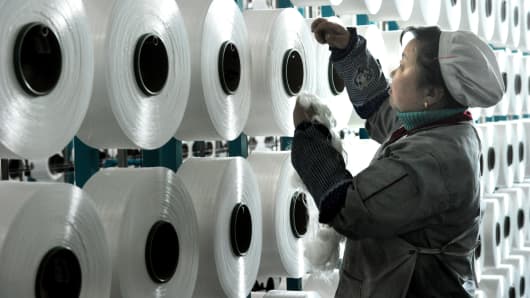But these are all symptoms of a larger problem yet to be addressed: China remains heavily geared toward manufacturing and exports, well past the point it should be.
Read MoreOp-ed: China's handling its market all wrong
Fifteen years ago, America's political leadership granted normalized trade relations to Beijing. China got a steady customer in exchange for promises of democratic reform and cheaper consumer products. We only got the latter, plus a few million lost manufacturing jobs.
But this model of authoritarian capitalism is tapping out. China's central planners are finding it tricky to execute the necessary turn from the world's foremost export economy into one based on domestic consumption and services.
Case in point: The incredible overcapacity in industrial sectors like rubber, cement, and steel.
Beijing might say that overcapacity is a serious problem – that more and more unneeded plants are being built in China with government support, churning out an increasing volume of unneeded products, and blasting an incredible volume of pollutants into its skies – but provincial governments are in no hurry to abandon entrenched growth models and inject unemployment into a restless population. So they keep building, and building, and building. Last year, China produced as much steel as the rest of the world combined.
Read MoreIf China loses control, look out oil: Dan Yergin
That's a serious problem for manufacturers and workers elsewhere. With no buyers at home for the glut of steel it shouldn't have produced in the first place, China's steel companies, replete with government subsidies, are exporting it at impossibly low costs.
As such, imports of Chinese steel into the U.S. market hit an all-time high in 2014. It's no coincidence that there have been waves of layoffs at American steel mills in 2015, and it's no surprise that the United States isn't the only country concerned with this surge of dumped steel.
None of this has given pause to China's state-led steel industry; production hasn't dropped off much so far in 2015, and Beijing hasn't yet used the full weight of its authority to rein it in. But legitimate outside pressure might force it into doing so.
If you want to get the Chinese government's attention, go after its money flows. The most commonsense way to do that, in this instance, is to toughen the rules of trade that its companies have grown so adept at flouting.
Read MoreChina's investors see savings 'fall into an abyss'
Right now, an American steel company has to be in the economic version of an Emergency Room before our own trade regulators will intervene. President Obama just signed a bill that finally changes that. Now, it's up to the administration to make sure the livelihoods of American workers don't pay the cost of poor planning from an authoritarian government on the other side of the globe.
Shrinking China's industrial overcapacity — in steel and at least 18 other industries — must be at the top of the president's trade to-do list, rather than an afterthought, because what happens in China doesn't stay there. When another country exports its problems to our shores for our own companies and workers to contend with, a response becomes necessary.
There have been more than 5,000 layoffs at American steel mills this year, and overall manufacturing job growth has stalled out. We've already lost millions of jobs to bilateral trade with a mercantilist partner in the Chinese government. It is unacceptable that we might lose even a single one more.
Commentary by Scott Paul, president of the Alliance for American Manufacturing.


